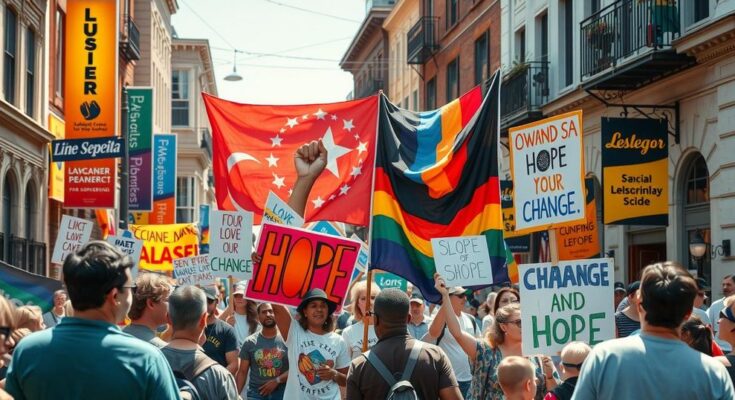Recent protests in Gaza signal a desire for change as thousands demand Hamas’s removal, recognizing the damage ongoing conflict brings. While media coverage may downplay these uprisings, they represent a critical shift in the conflict, needing support from both the international community and Israel to empower Gazans in reclaiming their future.
Recent protests in Gaza have sparked a renewed sense of hope amid the ongoing conflict. Thousands of Gazans have taken to the streets, demanding the ouster of Hamas, recognizing that the resumption of Israeli military actions could further devastate their lives. This popular uprising signals a potential shift in the Israel-Gaza conflict, even as media outlets appear to downplay its significance.
The media’s reluctance to cover these uprisings stems from an inclination to propagate Hamas’s narratives, often portraying Israel as the aggressor despite contrary evidence. A social media meme illustrates this dichotomy, showcasing an anti-Israel activist conversing with a Hamas terrorist, revealing the group’s admissions to various atrocities.
The protests must be supported as they represent the most viable path forward for a resolution. While Hamas has consented to a ceasefire proposal from Egypt, it is widely perceived as a tactic to stifle dissent rather than a commitment to peace. The ideal outcome remains the empowerment of Gaza’s citizens to reclaim their autonomy from terrorist influence.
Although this uprising may not address all of Israel’s complex challenges, it underscores the critical role Gazans must play in transforming their societal landscape. As many hostages have indicated, a significant portion of the population is radicalized, which emphasizes the urgent need for internal change among Gazans themselves.
However, the protestors face significant risks, including potential fatal repercussions for their defiance against Hamas. There is an urgent need for international support to bolster their courage, ensuring they understand that pursuing change is the only morally correct avenue for their future.
Support for the uprising must originate from Israel. It is essential to communicate that the country’s intent has never been to eliminate its neighbors but rather to dismantle terrorist threats. A groundswell of support against Hamas could unify Israeli society, benefiting both nations in the long term.
Amidst internal divisions concerning military action and hostages, supporting the Gaza uprising could unify Israel in a shared purpose against common foes. As one released hostage noted, divisions within Israel only embolden Hamas, indicating the paramount necessity for a cooperative stance.
Israel has the opportunity to illustrate a model for resolution and coexistence. While caution is advised, fostering internal correction in Gaza is key to establishing the coexistence that many desire. The future could hold promise for both Israelis and Gazans if the transformational energies of this uprising are harnessed effectively.
In conclusion, the protests in Gaza represent a crucial juncture in the Israel-Gaza conflict, offering hope for meaningful change. Despite media downplay, these demonstrations demand recognition and support from the international community. It is imperative for Israel to align with Gazans seeking to rid themselves of Hamas’s influence, thereby fostering a potential pathway towards coexistence. Through solidarity and support, both nations can endeavor towards a more harmonious future.
Original Source: www.jpost.com




